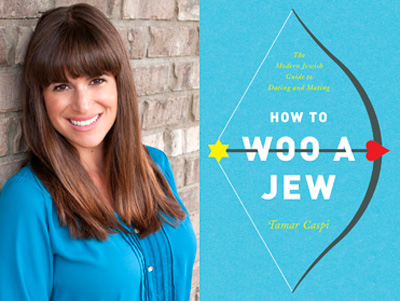Wooing a Jew in the Digital Age
Permanent link All Posts
I can safely say, until reading Tamar Caspi’s How to Woo a Jew: The Modern Jewish Guide to Dating and Mating, I’d never come across a dating advice book so specific to the Jewish experience. Caspi’s book covers everything from online dating to Jewish singles events to the taming of Jewish mothers.
Caspi, who is a syndicated Jewish dating advice columnist and also JDate.com’s official advice columnist and member advisor, takes readers on a journey, from her own revelation that she must mate Jewishly, to finding and wedding a Jewish beshert. Throughout her book, Caspi details the process of preparing oneself for love, finding love, and then keeping that loved one. She profiles several daters of varying ages and circumstances as case studies, to elaborate on her points throughout. After falling in love, facing heartbreak, and falling in love again, she offers a heart-felt guide for evaluating whether one is ready to get back on the proverbial horse after bad serial dating, or even after a heart-wrenching break-up of one’s own.

Photo Credit: © Tracy Renee Photography
Caspi also gives section-by-section advice on how to build the perfect JDate profile, understandably, because she works for JDate. Caspi, however, makes a misstep by failing to acknowledge the ever-growing presence of competing dating apps, and how they are changing the digital dating landscape altogether. I understood her choice to focus on the primarily Jewish dating outlets, but Jewish people are arguably using a combination of competing resources to find their mates. With each succeeding generation, communication between daters grows more complex with daters seeking instant gratification wherever they can find it—and it’s not difficult with increasingly affordable smart phones and thousands of phone apps.
Those seeking their mates are likely juggling dating profiles on multiple sites and apps. I think back to the 2005 film, Must Love Dogs, and it’s not that far from present-day online dating experiences, despite the rapidly changing digital dating environment. In the film, a divorced, 40-something Diane Lane (still more gorgeous than most 20-year-olds I know) seeks love anew via several online dating profiles. While we all aren’t 40-something, post-divorce, hot movie stars looking for love, the movie had an air of truth, as Lane’s character made several profiles with edited photos of herself, portraying various personas.
If we all had endless time and the appropriate lack of conscience, we could play a game of “Catfish” across numerous sites—and some do. That wasn’t necessarily Lane’s character’s intention, but daters approach the sites similarly today. Perhaps, the majority of modern-day digital daters aren’t trying to “Catfish” each other either (deceive each other online), but merely increase their odds, as Lane’s character attempted to do. (At one point in the film, she accidentally wound up on a blind date with her own father, so clearly no system is fool-proof.)
That said, if one is online dating, his or her inbox is likely inundated daily with matches and promotions from three to four sites or apps, if not more. With apps such as Coffee Meets Bagel and Hinge, one’s phone sends reminders at the same time each day to check out the app’s latest matches. Both apps offer limited match offers per day, which brilliantly, keeps the user coming back for more. For instance, Coffee Meets Bagel only offers the user one match a day. If one has enough “beans” (points) from referring friends to the app, Coffee Meets Bagel might unlock a few more surprise matches. Similarly, Hinge offers a select number of matches a day.
The most superficial of the recently popular apps is Tinder, which offers endless choices from which to choose. Swiping “yes” or “no” (right or left, respectively) is a bit like playing a slot machine or a game of cards. When one has swiped in approval of a picture, and that same person swipes in approval, “It’s a Match” pops up on the phone, encouraging the user to chat or “keep playing.”
“Tinder works like walking into a room, looking around and subconsciously going ‘yes, no, yes, no’ while scanning people,” Tinder co-founder and CEO Sean Rad said in an Entrepreneur.com article.
“If you give someone across the room that look and they give you that look back, you’re now both responding in the moment and that’s a match,” Rad added. “It’s because Tinder does this so well that we’ve experienced exponential growth, all without spending a dollar on marketing and advertising, not a dime on user acquisition. It’s people.”
While Tinder might mimic real-life first meetings in one regard, it’s also akin to older sites, such as “Hot or Not,” a site originally used for ranking people based on their looks, or Grindr.com, which historically attracted those looking for casual encounters.
Tinder has revolutionized technology-assisted dating, according to Time.com writer Laura Stampler in an article entitled, “Inside Tinder; Meet the Guys Who Turned Dating into an Addiction.”
While traditional dating sites require extended time in front of a desktop computer, writing and browsing bios, Tinder responds to a mobile generation, Stampler said, “played in short bursts on the go.”
“Smartphone apps have turned courtship into an addictive pastime,” posited Stampler in a companion article titled, “The New Dating Game.”
She goes on to say that Tinder both appeals to and reinforces millennial stereotypes.
“Tinder is one of a host of new mobile dating apps based on a system of snap judgments that function kind of like a game for millennials,” Stambler said. “We've been dubbed the hook-up generation, ambitious multitaskers who commit reluctantly and are obsessed with digital distractions.
“This is both true and an oversimplification. These apps play to stereotypes while simultaneously perpetuating them,” Stambler added. “Because even if we typically marry three to four years later than Gen Xers, we still (eventually) want love, and it's too soon to know if this crop of dating apps will make finding it easier or leave us trapped in a new kind of flirting limbo.”
In How to Woo a Jew, Caspi suggests that perhaps we are too prepared before meeting potential mates, having dissected their profiles, and potentially researched them online before meeting. As a digital dating advice guru, she actually encourages daters to get off line as quickly as possible, set up a date, and actually meet.
Some consider desktop dating sites a fading venture (along with desktop computers, themselves), and like playing the “dating slots” with quicker, addictive dating apps.
Perhaps, Rad is correct, in that Tinder allows users to make a return to the dating basics. First comes attraction, then connection, etc. However, a lot is lost when users make snap judgments with little-to-no accompanying information.
A newer app, JCrush, attempts to mimic Tinder, but hasn’t quite taken off in the same way. Similarly, JDate has improved its mobile capabilities, likely to compete with other phone dating outlets.
However, Rad admits that he doesn’t think people join Tinder because they’re looking for something serious.
Digital daters are thus left with a confusing pool of dating outlet choices, none of which, likely make daters better communicators or more equipped to find love.
“Dating is nothing if not confusing,” Caspi writes in How to Woo a Jew. “I get tons of emails asking for help with conundrums such as, ‘He calls me regularly, but doesn’t ask me out,’ or ‘He texted me after our date but I haven’t heard from him since.’
“A majority of the blame belongs to the current popular forms of communication: email, instant messages, and texts. Not knowing the tone, the sarcasm, or the intent of a written message can be a cause for confusion,” she added.
When we treat dating like a game, which newer apps increasingly encourage us to do, we’re less likely to make a real effort—with something as simple as even picking up the phone.
With traditional dating sites, digital daters were already developing a window shopping syndrome, in which one scarcely read entire profiles and easily dismissed potential mates. Apps such as Tinder only exacerbate this problem. And, how do you get people to stick around in a world of seemingly infinite possibility?
I’m reminded of an episode of Sex in the City, in which Carrie pleads with “Big” to give their relationship a real shot.
“I've done the merry-go-round, I've been through the revolving door. I feel like I met somebody I can stand still with for a minute,” Carrie said. “And… don't you wanna stand still with me?”



.jpg)



